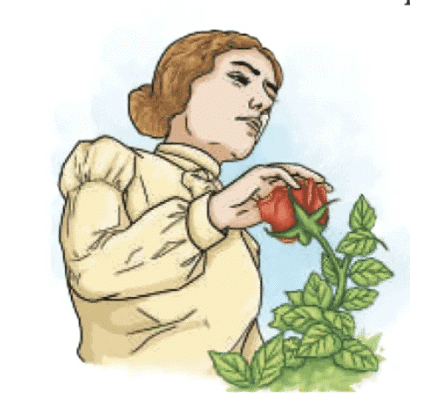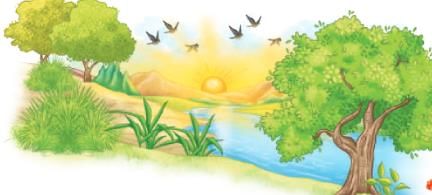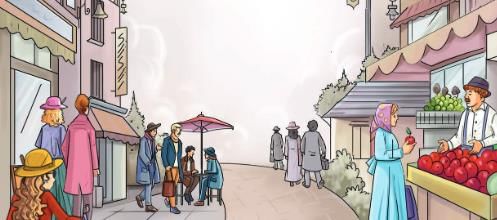Multiple Choice Questions (MCQs)
Q1: Who is the author of the essay “Three Days to See”?
a) Eliza Cook
b) Kamala Nair
c) Helen Keller
d) King Bruce
Ans: c) Helen Keller
The essay is written by Helen Keller, a well-known author who was blind and deaf.
Q2: What does Helen Keller enjoy doing to experience the world?
a) Listening to music
b) Touching things
c) Painting landscapes
d) Writing stories
Ans: b) Touching things
The essay describes how Helen enjoys touching things like leaves, tree bark, and buds to experience the world, as she cannot see or hear.

Q3: What does Helen plan to do on the first day of having sight?
a) Visit museums
b) Watch the sunrise
c) See her friends’ faces
d) Observe city life
Ans: c) See her friends’ faces
On the first day, Helen plans to see the faces of her friends and loved ones to understand their feelings, as stated in the essay. The other activities are planned for the second and third days.
Q4: What does Helen call the eyes in the essay?
a) Mirror of the heart
b) Window of the soul
c) Light of the mind
d) Door of the spirit
Ans: b) Window of the soul
Helen refers to eyes as the “window of the soul” when describing her desire to look into her friends’ eyes to understand their true feelings.
Q5: What is the meaning of the word “panorama” in the essay?
a) A quick look
b) A wide, beautiful view
c) A small shake
d) A tiny piece of food
Ans: b) A wide, beautiful view
The word “panorama” is defined in the essay as a wide, beautiful view, used to describe the sunrise Helen wants to see. The other options correspond to words like “glimpse” (quick look), “quiver” (small shake), and “morsel” (tiny piece of food).

Fill in the Blanks
Q1: Helen feels the _______ of a leaf to enjoy its shape.
Ans: symmetry
Q2: On the second day, Helen wants to watch the _______.
Ans: sunrise
Q3: Helen plans to visit _______ to learn about history.
Ans: museums
Q4: The word “quiver” describes a small, fast _______.
Ans: shake
Q5: Helen encourages people to use their _______ to find happiness.
Ans: sensesTrue or False Questions
Q1: Helen Keller plans to spend her third day in a quiet village.
Ans: False
Helen plans to spend her third day in a busy city to observe people’s daily lives, not in a quiet village.
Q2: Helen believes sight is the most wonderful sense.
Ans: True
Helen states in the essay that she considers sight the most wonderful sense among all.
Q3: Helen feels sad when she sees people smiling in the city.
Ans: False
Helen says she feels happy seeing people smile in the city, not sad.
Q4: The word “mastodons” refers to ancient animals like elephants.
Ans: True
The essay defines “mastodons” as big, furry animals like elephants that lived long ago.
Q5: Helen Keller could see and hear throughout her life.
Ans: False
Helen Keller was blind and deaf, unable to see or hear.

Very Short Answer Questions
Q1: What does Helen touch to feel nature waking up in spring?
Ans: Tree buds
Q2: What does Helen want to see on the third day?
Ans: People’s daily lives
Q3: What sense does Helen consider the most wonderful?
Ans: Sight
Q4: What is the meaning of the word “companionship” in the essay?
Ans: Feeling close to friends or family
Q5: What does Helen suggest people do with their senses?
Ans: Use them fullyLong Answer Questions
Q1: How does Helen Keller plan to spend her first day of sight, and why is it important to her?
Ans: On the first day, Helen Keller plans to see the faces of her friends and loved ones who have shown her kindness and friendship. She wants to look into their eyes, which she calls the “window of the soul,” to understand their true feelings, as she usually knows them by touching their faces. This day is important to her because these people have made her life special, and seeing their expressions would deepen her connection with them. It reflects her gratitude for their companionship and her longing to experience their presence in a new, visual way.
Q2: Describe what Helen plans to do on the second day and what she hopes to learn.
Ans: On the second day, Helen plans to wake up early to watch the sunrise, marvelling at the beautiful transition from night to day as the sun brightens the earth. She also intends to visit museums to explore the world’s past and present, viewing models of ancient animals like dinosaurs and learning about human progress over time. She hopes to gain a deeper understanding of nature’s beauty and the history of life, appreciating how the world has evolved and how human knowledge has grown.
Q3: Explain how Helen’s third day reflects her interest in ordinary people.
Ans: On the third day, Helen plans to go to a busy city and stand at a street corner to observe people’s daily lives. She wants to look at their faces to see if they are smiling, serious, or sad, feeling happy for those who smile, proud of those working hard, and kind toward those struggling. This reflects her interest in ordinary people because she seeks to connect with their emotions and experiences, valuing the everyday moments that define human life. Her focus on their expressions shows her empathy and desire to understand their joys and challenges.
Q4: What is the moral of the essay, and how does Helen encourage readers to apply it?
Ans: The moral of the essay is to appreciate and fully use our senses to find joy in the world, as they are precious and can be lost. Helen encourages readers to apply this by urging them to use their eyes as if they might lose their sight tomorrow, and to engage all senses—listening to music, touching things, smelling flowers, and tasting food—with the same urgency. She believes this approach brings happiness and fosters gratitude for life’s small wonders, like a leaf or a smile, inspiring readers to live with wonder and awareness.
Q5: Discuss how Helen Keller’s experiences as a blind person shape her perspective in the essay.
Ans: Helen Keller’s experiences as a blind person deeply shape her perspective in the essay. Unable to see or hear, she relies on touch to experience the world, finding joy in the shapes of leaves, tree bark, and buds, which heightens her appreciation for sensory details. Her longing for sight drives her to imagine three days of vision with intense focus, prioritising meaningful experiences like seeing loved ones, nature, history, and ordinary people. Her perspective emphasises gratitude for senses others may take for granted, and her reflections on losing sight again highlight her resilience and ability to find happiness despite her challenges, inspiring readers to value their own senses.